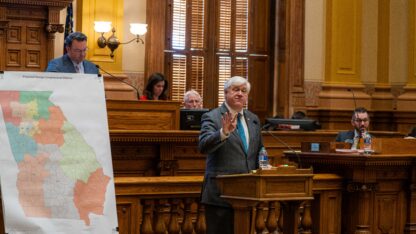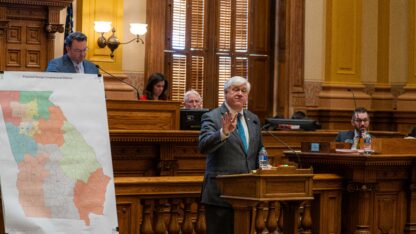Georgia Senate again pushes $6,000 school voucher bill

Georgia Senate Republicans are again pushing a plan to give $6,000 educational vouchers to many students, part of a nationwide push for what supporters call education savings accounts following the COVID-19 pandemic. The movement is fueled in part by fights over race-related education and how to address gender issues in schools.
The Senate Education and Youth Committee voted 6-5 on Tuesday to pass Senate Bill 233, sending it to the full Senate for more debate. The bill must pass the Senate by Monday for the state House to take it up, or it will likely die for 2023.
Supporters argue that the vouchers for private school tuition, home schooling supplies, therapy, tutoring or even early college courses for high school students would help students who aren’t well-served by local school districts.
“Even in the best of the best, public education is not one size fits all,” Sen. Greg Dolezal, a Republican from Cumming who sponsors the bill, told the committee.
Opponents argue the bill would pressure the state’s $12.5 billion K-12 school funding formula, and that $6,000 would not be enough to pay tuition at most private schools, meaning the money would benefit middle class and rich families more than poor ones.
“Those failing schools are almost always in areas where those children are dealing with poverty,” Lisa Morgan, president of the Georgia Association of Educators, told the committee. “We must fund our public schools first and not continue to take resources away from our children whose only chance at an education is in our public schools.”
Supporters, though, dispute those claims. Dolezal amended the bill to say that no more students could join the program in any year in which the state doesn’t appropriate the full amount called for by the formula. He also noted that $6,000 is less than the average amount of state aid given to each of Georgia’s 1.75 million public school students, and that local systems would keep their property tax dollars allocated for public education.
Buzz Brockway, a former Republican state House member and chairman of the State Charter Schools Commission, told lawmakers that about 500,000 Georgia students attend schools graded “D” or “F” by the state.
“Those are the kids that need our help, and they need this bill,” said Brockway, who works for the Georgia Center for Opportunity, a poverty-fighting group.
A state Senate committee heard testimony this summer from witnesses who said the state needs to add extra money to its educational formula for students in poverty.
“If our schools are failing, it’s because they don’t have the resources they need to get whatever ‘A’ grade you’re hoping they get,” said Cindy Battles, a lobbyist for the liberal-leaning Peoples Agenda group.
Georgia already has programs giving vouchers for special education students in private schools and state income tax credits for donors to private school scholarship funds. A bill is pending to increase tax credits for donors to the private school scholarships, from $120 million to $200 million a year. The bill under consideration Tuesday would allow parents to direct spending as they wanted, including for home-schooling.
Students currently in public school or starting kindergarten would qualify for the money. Those now in private school or being home-schooled would not. Participating students would have to take a yearly standardized test, either from the state or from some national group, which Dolezal lauded as an accountability feature. One of the big criticisms of Georgia’s current school choice program is that it’s impossible to tell how beneficiaries are doing academically.
The bill’s prospects are unclear. State senators rejected a similar plan last year on a 29-20 vote, although some Republicans who voted no may have have been motivated by opposition to then-Sen. Butch Miller’s bid for lieutenant governor. Miller lost a primary to current Republican Lt. Gov. Burt Jones.
The road could be even tougher in the House, where some rural Republicans have long resisted school choice expansions.








